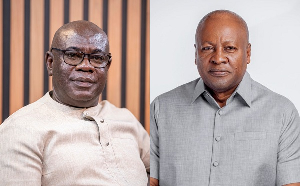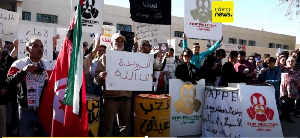-A critique
Brain drain and other forms of migratory related issues are undoubtedly among the most charged and contentious issues of our time. The debates surrounding the topic have never been devoid of individual sympathies, ideological leanings and political positions. Even research findings, depending on set of measurable factors or parameters, have never been congruent in estimating the cost and benefits to both losing countries and countries of immigration.It is in this complex debate that researches meant to elucidate the subject matter must capture all its key aspects for a holistic analysis (holism) rather than adopting strict quantitative models of analysis assuming everything must be proved economically as demonstrated by Dr. Peter Quartey in his recent work; pitching the debate between poverty and remittance, brain drain and brain gain to the neglect of the qualitative human experiences, trends, the political and ideological issues among others, which are fundamental to the analysis of brain drain and other migratory related issues.
To ignore the extent to which the interactions at all levels in the processes that generate the remittance: qualitative processes, the political debates in both countries of immigration and sending countries, ideological inclinations of governments, individual sympathies, which permeates the economic results, is to tilt the debate without due consideration for the aforementioned dynamics, as the case is. The results, therefore, could be problematic and must be opened for further discussion as the aforementioned elements are defining characteristics of the phenomenon.
The realities of the migratory trend which I seek to construct here, but in brief, are completely dichotomous. Any keen observer of migratory trends characteristic of the Ghanaian situation will concur that there are two important contradictory dimensions to the trend: its elite and mass characteristics.
Through a comparison of the ease of travel and visa acquisitions for the highly-skilled, we may learn about the choices and the alternatives opened to the unskilled. Indeed, with about 50% of the highly-skilled Ghanaian in OECD countries especially Britain, America and Canada, it is clear that travel restrictions for the highly-skilled are dispensed for the benefits receiving countries derive from their contributions. Comparatively, the unskilled who may be perceived to be of little value to recipient countries are filtered. The result is that since their de rigueur contributions are in the corporate investment which trained the highly-skilled who have migrated with far-reaching implications for social services at home, they take to the desert to reach their greener pastures. Over 3000 of these individuals of sub-Saharan African origin are estimated to have perished in the process. This number is high enough for any research on migration to capture in its analysis as the balance between the costs and the benefits are weighted. Failure to capture these important developments implies these individuals do not matter in the process but when they manage to reach their intended destinations, their remittances are wholly recognizable.
This is similar to a story which is still told today along the lagoons of the Republic of Benin and comparable to it. According to Manning Patrick (1990), the inhabitants along the lagoons of Benin believe that cowries were obtained by the use of slaves. ‘A slave was thrown into the sea and allowed to drawn. The cowries would grow on the body of the slave, and after a time the body would be dredged up and the cowries collected from it.’
He intimated that the story is both true and untrue: ‘Cowry shells, of course, were money in Africa. The story is untrue in that cowries grow in the Indian ocean, not in the Atlantic or the lagoons edging it, and untrue in that slaves were not drowned in order to get them. But the story is true as well as picturesque in its presentation of the sacrifice made in order to gain money in exchange. It is a stark example of ideology justifying slavery in Africa. Africans seem to throw away a precious resource, young men and women, in exchange for money-for cash, in his estimation.
Further to this, the political discourses in recipient countries do not suggest that immigration is a trouble-free or straightforward issue. Both in the United States and Britain, immigration and its related issues have become key political issues with far-reaching political implications for politicians. The result is that immigration and its cognate words have become completely threadbare and are beginning to assume very negative nuances in countries of immigration in recent times. The words arouse trepidation, angst, and lost of nerve among immigrants and would-be immigrants, whilst whipping up animosity, xenophobia and the toughening of unwelcoming attitudes in local/recipient communities towards immigrants. This, in fact, complicates the integration processes in recipient countries. Understanding these processes therefore requires the full attention of researchers, observers and the state in their bid to capture the issue of migration in its totality.
The anticipation that the homecoming of the highly-skilled professionals in the near future could lead to ‘brain gain’ or transfer of technical expertise is also compromised by the inability of most of these professionals to serve in capacities in commensuration with their skill levels. Whilst some are caught up in a ‘study trap’, as they keep accumulating degrees to retain their status, others end up in the black economies of recipient countries; but in both cases, skills and expertises needed to transform the economy back home are wasted in performing menial tasks due to discriminatory attitudes of employers. To this end, most Ghanaians may return home with academic and professional qualifications without the complimentary hands-on experiences. And, when this occurs at the sunset of their lives, this final return will only be for retirement with little or nothing to contribute in terms of know-how.
In the Ghanaian milieu, due to the disparities in rural-urban plus northern-southern educational systems, access to education and other social amenities are to the advantage of urban populations. For the poor in Ghana, of which 70% are in the rural areas, to attain tertiary level education let alone pursuing top-notch programmes like medicine and law is like the proverbial Biblical camel going through the eye of a needle. The correlation, therefore, is that though the poor, through their de rigueur contributions fund education in Ghana, they benefit the least in terms of direct benefits derive through education. Their predicament is further compounded by the fact that they are the ones in the $1 or less a day bracket and unable to sponsor their progenitors to seek greener pastures overseas. As a result, remittances again trickle down to the urban-middle-class and the rich without reaching the rural poor.
Assuming that the top foreign exchange earners for the Ghanaian economy are: cocoa, gold and, recently, remittance from abroad. If the two most important: Cocoa and gold emanate from the rural areas of Ghana and with the third unable to trickle down to them, then we must rethink the new form of unequal access that is emerging in light of the first two and other social factors like health and education-related topics which are beyond the scope of this critique.
Recent developments on the labour front in Ghana suggests that government’s attempt to stem the tide of the high haemorrhage of health professionals from the country by increasing their emoluments has triggered similar demands from the country’s graduate teachers. Incontrovertibly, this highlights the fact that when all state institutions are competing for scarce resources, individual’s education in relation to the economy (production) is an important tool for social stratification rather than the concept of how economically mobile one group is to the other.
Ghana’s human development indices, according to the recent UN human development index, indicate human development is in a reverse gear. It is therefore unjustifiable for researchers to try to justify the brain drain by comparing Ghana with countries like India and the Philippines where there are clear mechanism in place to utilize the benefits of migration and the brain drain.
In sum, abstracting remittance from the social, political and economic interactions cannot be an effective analytical substitute for any holistic approach to a study on the subject. I therefore call into question Dr. Peter Quartey’s recent presentation at the British Council on the topic. There is, however, no doubt in my mind that the issue will be one of the key issues that will inform Ghana’s political discourse as the country heads towards its 5th democratic election in the 4th republic.















